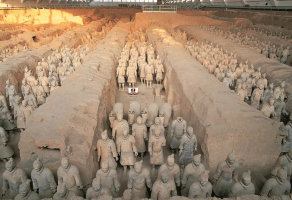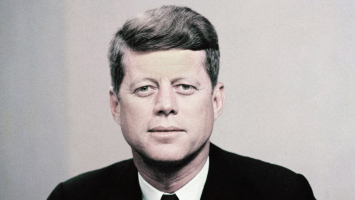Top 10 Major Achievements of Kiran Bedi
Kiran Bedi is not only a good sportsperson, but she is also a multi-talented woman in everything from scene to mentor. Therefore, she has left many ... read more...achievements for herself. The following article of Toplist will introduce you to the major achievements of Kiran Bedi.
-
Kiran acquired an interest in lawn tennis at the age of nine while watching her father, Prakash Lal Peshawaria, a tennis lover and capable player. Prakash Lal taught his daughter how to play tennis and was an important part of Kiran's tennis career. She began competing as an amateur tennis player at the age of 14, cutting her hair short since it interfered with her game. Kiran competed in her first competition outside of Amritsar in 1964, losing in the first round of the National Junior Lawn Tennis Championship at Delhi Gymkhana Club.
Despite this, she went on to win the trophy two years later, at the age of 17, with iron tenacity and a never say die mentality. She was entitled to compete in the Wimbledon Junior Championship as the National Junior Champion, but the Indian government did not nominate her. Kiran won various tennis championships between 1965 and 1978, including the Asian Lawn Tennis Championship in 1972, but her crowning triumph came in 1976 when she won the National Women's Lawn Tennis Championship. Kiran Bedi was also a member of the Indian squad that won the Lionel Fonseka Memorial Trophy in Colombo by defeating Sri Lanka. Kiran played tennis till he was 30 years old. Becoming the national women's lawn tennis champion is seen as one of the major achievements of Kiran Bedi.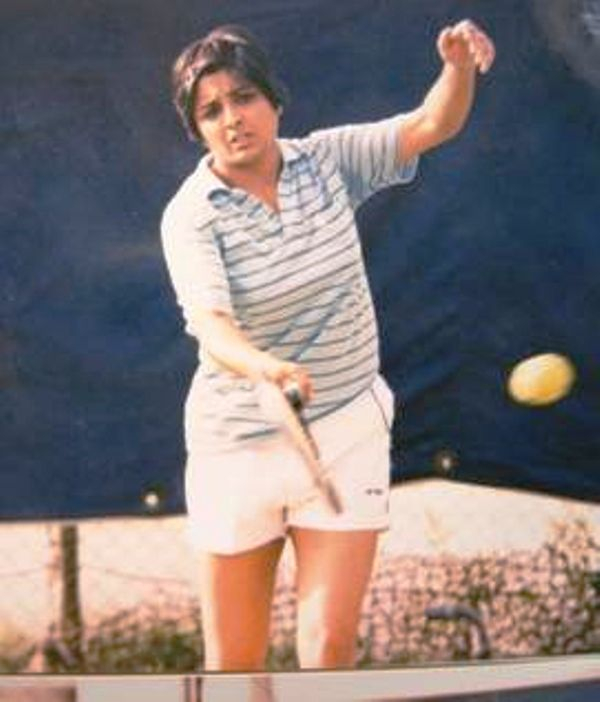
Photo: https://225508-687545-raikfcquaxqncofqfm.stackpathdns.com/ 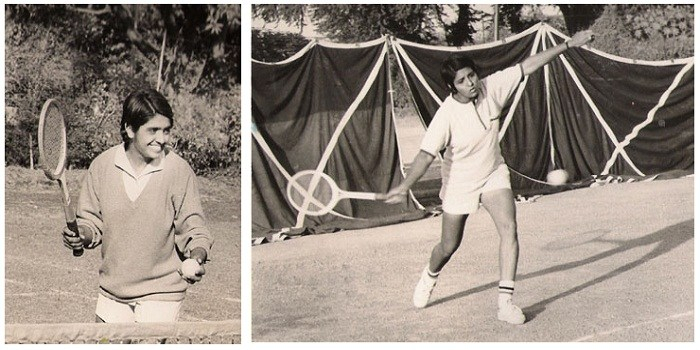
Photo: https://newsmobile.in/ -
Kiran graduated from the Government College for Women in Amritsar in 1968 with a Bachelor of Arts Degree in English (Honors). She also graduated from Punjab University, Chandigarh, with a Master's Degree in Political Science in 1970. Kiran served as a lecturer at Khalsa College for Women in Amritsar after completing her postgraduate studies, where she taught political science classes. Meanwhile, Kiran frequented the Amritsar Service Club, where she met Senior Civil Servants who pushed her to pursue a career in the public sector. She passed the highly proficient Indian Civil Services Examination two years into her teaching career and became an Indian Police Service (IPS) Officer in 1972. She became the first woman in India to enter the renowned service as a result of the event.
Kiran Bedi received her education at Mussoorie's National Academy of Administration, where she was the only woman in a class of 80 men. In 1975, she began working as an Assistant Superintendent of Police (ASP). She served as the Chief of New Delhi Traffic Police, DIG of Police in Mizoram, Advisor to the Lt. Governor of Chandigarh, Director General of Narcotics Control Bureau, and Civilian Police Advisor for United Nations Peacekeeping Operations during her long career in the Indian Police Service. She voluntarily retired from the Indian Police Service on November 27, 2007, after 35 years of loyal service, to focus on academics and social work. Becoming the first female IPS officer in India is considered one of the major achievements of Kiran Bedi.
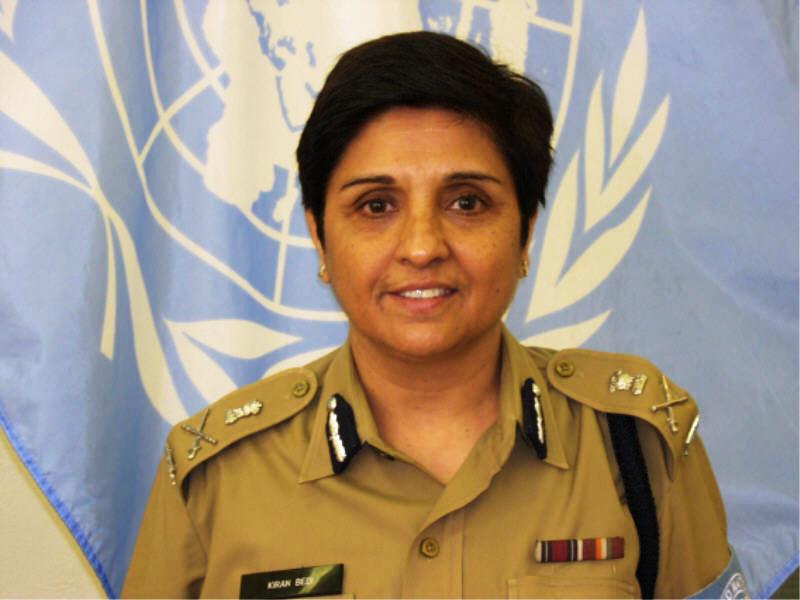
Photo: http://1.bp.blogspot.com/ 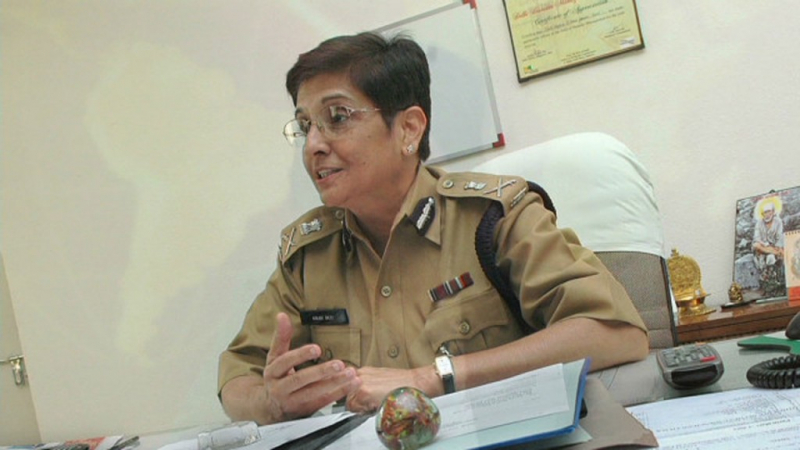
Photo: https://www.storypick.com/ -
Kiran Bedi began her career in the Chanakyapuri area of Delhi in 1975. The Parliament building, foreign embassies, and the Prime Minister and President's houses were all located in Chanakyapuri, a wealthy neighborhood. The majority of the crimes in the area were minor thefts, although political demonstrations were common. On November 15, 1978, a group of Nirankaris gathered at India Gate for a congregation. A contingent of 700–800 Akalis staged a counter-demonstration, resulting in numerous conflicts between the sides. As a result, Deputy Commissioner of Police Kiran Bedi was dispatched to disperse the demonstrators and avert bloodshed.
One of the demonstrators approached her with a bare sword as the protesters resorted to brick-batting, but regardless of her own safety, she charged the demonstrator and others with the cane, which eventually dispersed the demonstrators and restored peace in the neighborhood. Despite the lack of help from the tear gas squad, she showed remarkable courage and determination in restraining the unruly demonstrators, putting her life in jeopardy. Kiran Bedi was given the President's Police Medal for Gallantry by the President of India in 1979 for her bravery. Being awarded the Presidential Police Medal in 1979 is considered one of the major achievements of Kiran Bedi.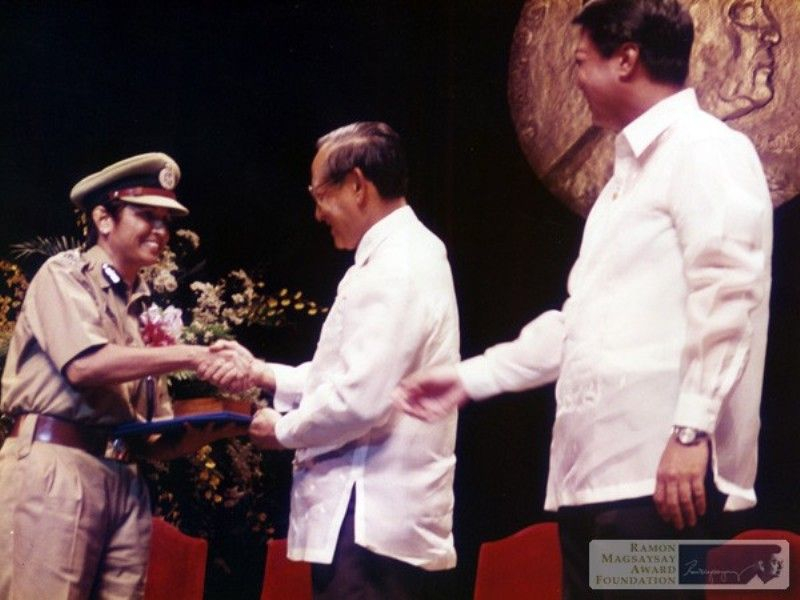
Photo: https://225508-687545-raikfcquaxqncofqfm.stackpathdns.com/ 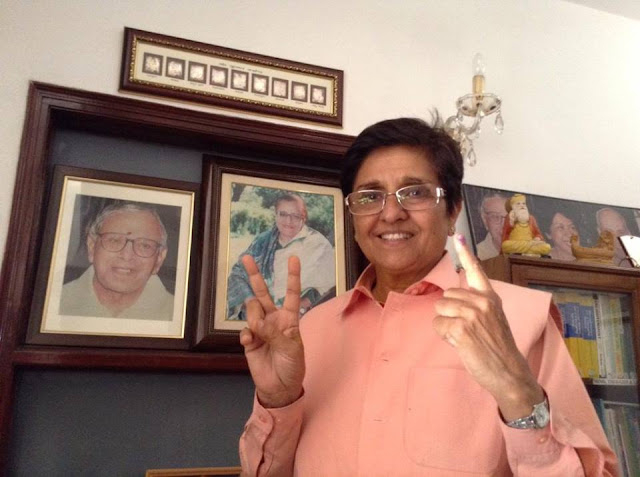
Photo: https://4.bp.blogspot.com/ -
When Bedi was sent to Delhi's West District in 1979, the area was experiencing a surge in criminal activity and sexual assault charges against women. Furthermore, there were insufficient cops to deal with the unfavorable situation. Kiran Bedi devised a plan to combat the crimes with the help of recruited civilian volunteers to deal with the crisis. Six civilian recruits, commanded by an armed policeman, began patrolling each village. Citizens were inspired to interact with her because of her unusual approach. She instituted an Open Door Policy and anonymous reporting of any offenses she was aware of. The results were amazing, with a dramatic decrease in the number of occurrences of eve-teasing/sexual harassment in just three months. In order to curb crime in the neighborhood, she also cracked down on bootlegging and the illegal liquor trade.
Kiran Bedi has made a significant contribution to reducing the crime rate in Delhi. Although she is a woman, she takes on a large responsibility in crime prevention. Crime reduction in the West District of Delhi is considered one of the major achievements of Kiran Bedi. This also proves that she is a multi-talented, responsible woman at work.
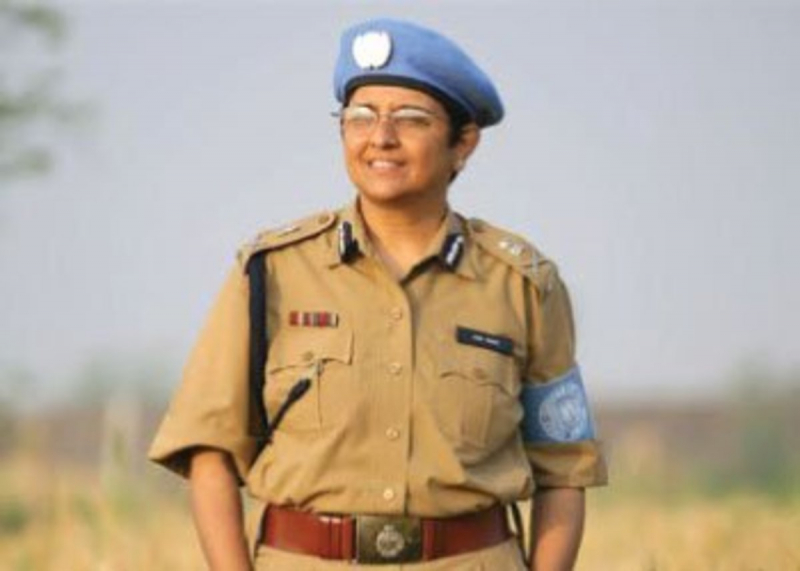
Photo: https://images.saymedia-content.com/ 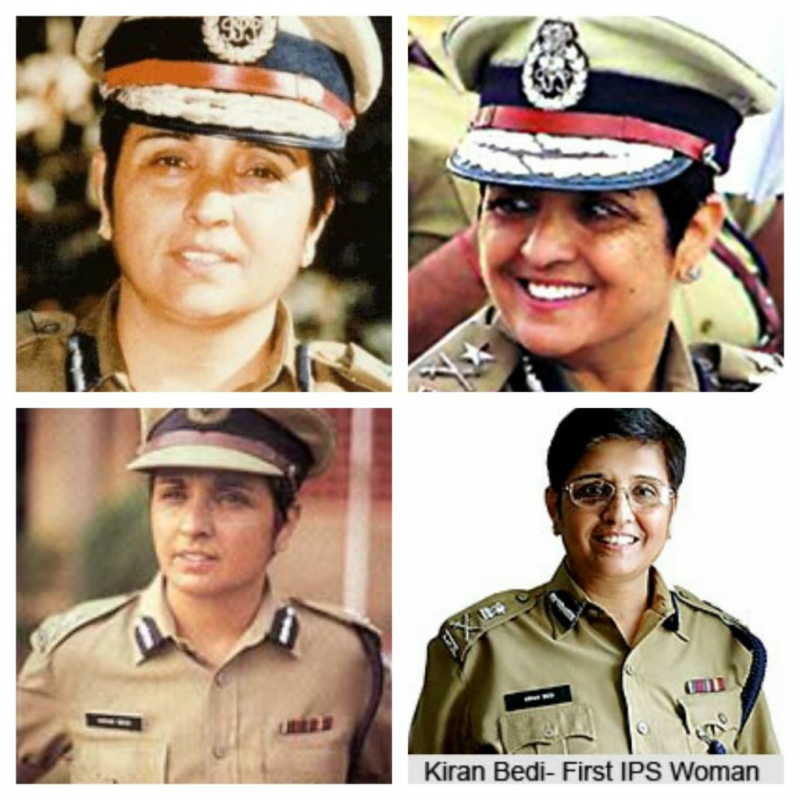
Photo: https://pbs.twimg.com/ -
Dr. Kiran Bedi was appointed Deputy Commissioner of Police of Delhi's North District in 1986. The area's main problem was drug abuse. At the time, the New Delhi Municipal Corporation operated the only drug addiction treatment center in Delhi (Ashiana). Bedi came up with yet another creative remedy after considering the gravity of the matter. She founded a non-governmental organization with the aid of her senior officers, as well as 16 serving Delhi Police officers. Detox centers were established on police grounds to aid in the rehabilitation of drug users, as well as the education of street children, the development of vocational skills for female drug dealers, and detox programs. Doctors and Yoga Teachers volunteered their time and talents to these detox centers, which were funded by community donations. The concept caught on, and within a few years, numerous Detox Centers were established, each having the capacity to handle 30 to 100 patients.
Kiran Bedi traveled the length and width of India, raising awareness about the program, the effects of drug usage, and the role of schools, colleges, parents, law enforcement, and the community. Kiran's effort became a trailblazing movement, and the Non-Profit Organization was renamed Navjyoti India Foundation (NIF) in 2007. "Navjyoti" means "New Light," and "NIF" means "New Light." Since then, NIF has helped almost 20,000 drug and alcohol addicts in residential treatment and thousands more through community outreach initiatives in India. Apart from therapy, the center has received funding from a German NGO and the US government to expand its research and training capabilities. Navjyoti now has overwhelming support from the Indian government, and they have rapidly expanded to address other social concerns such as illiteracy and women empowerment.
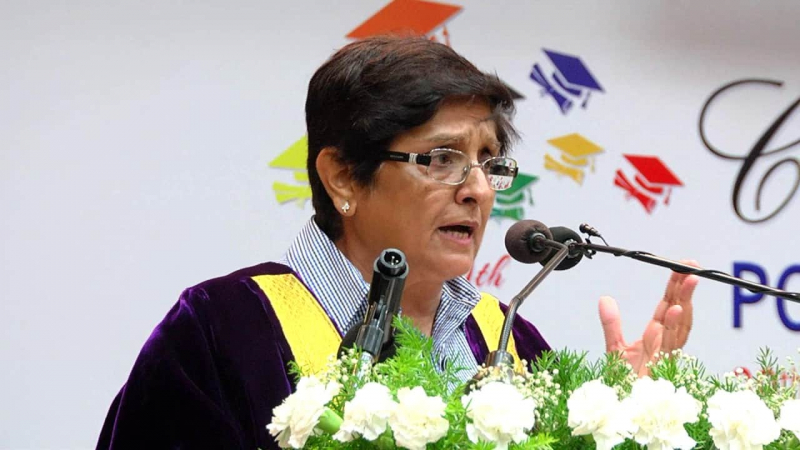
Photo: http://www.womenexclusive.in/ 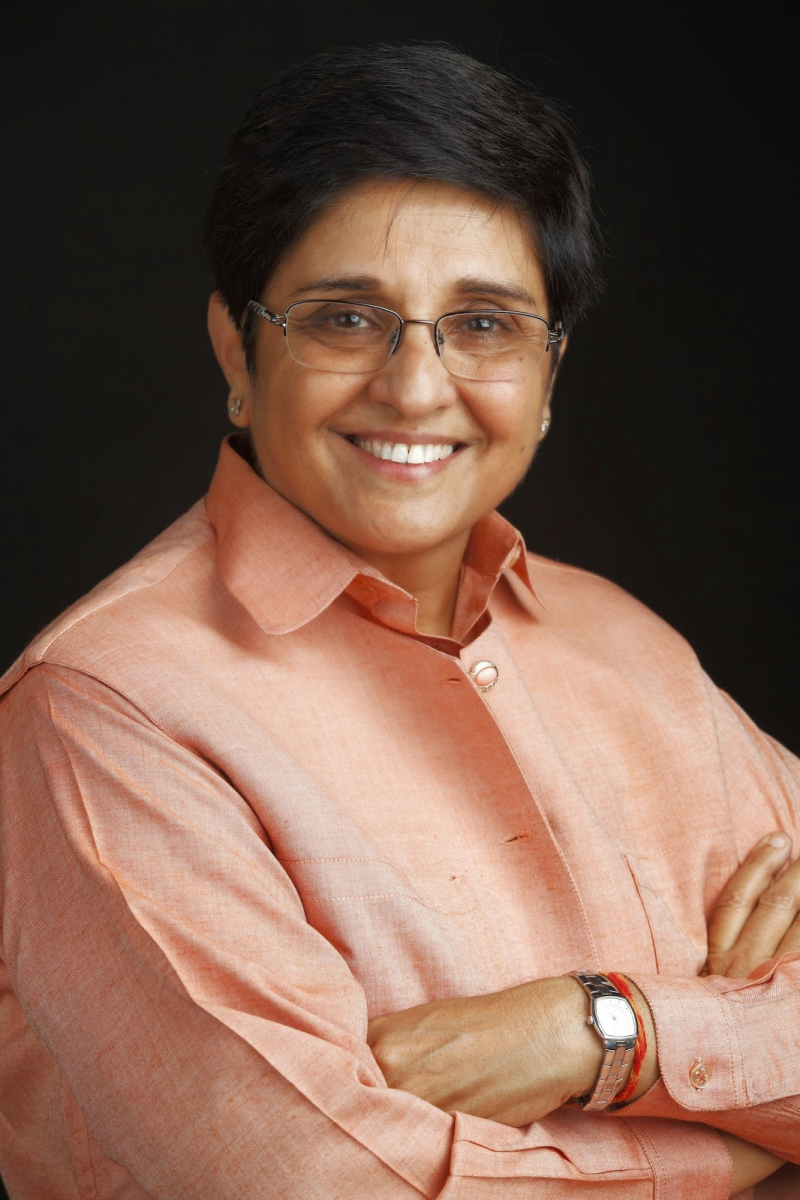
Photo: http://4.bp.blogspot.com/ -
Kiran Bedi was appointed Inspector General of Police (IG) of Delhi Prisons in May 1993. The most renowned prison in India, Tihar Jail in Delhi, was the task this time; a nightmare for most policemen. The prison was a four-jail complex with a capacity of 2500 inmates, but it was housing around 9000 at the time. The vast majority of these detainees were facing charges of non-bailable offenses. The area had a meager budget of 15 crores, was plagued by violent incidents, and was deemed unmanageable. Bedi resolved to take up the challenge and make Tihar into a Model Prison.
While acting as the Inspector General of Prisons from 1993 to 1995, she implemented some important management improvements. Bedi provided for Certificated Prisoners to receive Vocational Training so that they might find work after their release. To improve the prisoners' mindsets, yoga and Vipassana Meditation classes were established, as well as other activities such as sports, prayer, and festival celebrations. A De-Addiction Center was formed, and employees who were implicated in drug distribution were severely punished. A bakery, as well as modest manufacturing facilities such as carpentry and weaving, were established. The proceeds from the sale of the products were donated to the Prisoners' Welfare Fund.
Bedi enlisted the help of outsiders such as NGOs, schools, civilians, and former convicts in his Prison Reform Program. She went on daily prison tours, monitoring the personnel, listening to the concerns of the inmates, verifying the food quality, and assessing the general management. The number of conflicts and disruptions in the jail decreased as a result of her initiatives, and the program went on to achieve worldwide praise. Kiran Bedi's brief stay in the prison is seen as a golden era in the institution's history. Her work in Tihar earned her the Ramon Magsaysay Award (also known as Asia's Nobel Prize) and the Jawahar Lal Nehru Fellowship in 1994. This is also considered one of the major achievements of Kiran Bedi.
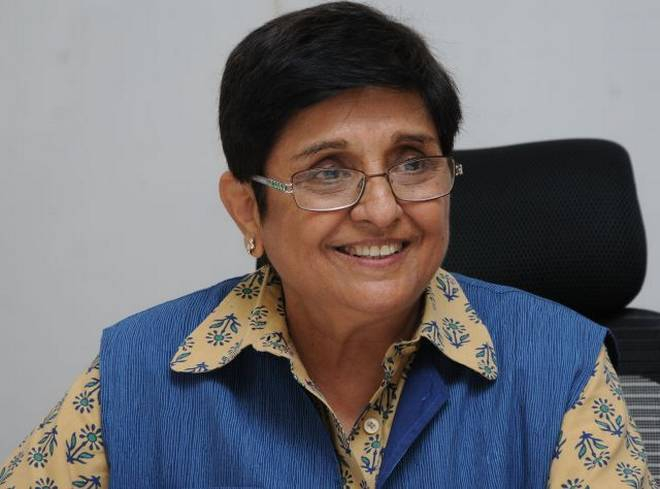
Photo: https://storage.googleapis.com/ 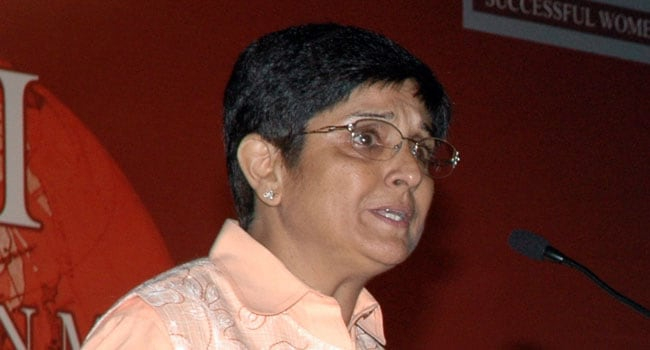
Photo: https://smedia2.intoday.in/ -
Kiran Bedi was offered a position as a Senior Advisor at the United Nations in New York in 2002. She consented to the suggestion and was chosen from a vast pool of excellent candidates due to the promise of getting international experience on a greater scale. The 7th Secretary-General of the United Nations, Kofi Atta Annan, named her as the Civilian Police Advisor in January 2003. Bedi made history when she became the first woman to hold such a position at the UN. She worked with her colleagues in the Department of Peacekeeping Operations, under the supervision of her superior, Under-Secretary General Jean Marie Guehenno. During her employment, she traveled extensively, authored studies, gave speeches, and interacted with a variety of universities and institutions. She returned to Delhi in 2005 following a successful tenure as a Civilian Police Advisor at the United Nations.
The Delhi Bar Association has been pushing to prevent her from being appointed to a position that would put her on the fast track to becoming the city's police chief. Bedi's elevation to the top position, the lawyers argued in a letter to government officials, may "unnecessarily cause confrontation between the legal fraternity and the police." She was promoted to the position of General Manager, Bodyguard. She was the Director of the Research and Development Police Department prior to her retirement.
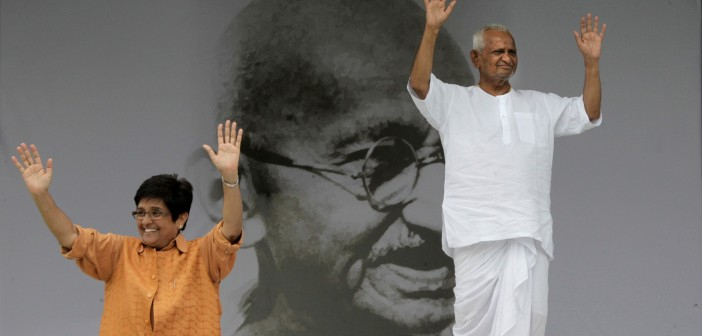
Photo: https://www.humanosphere.org/ 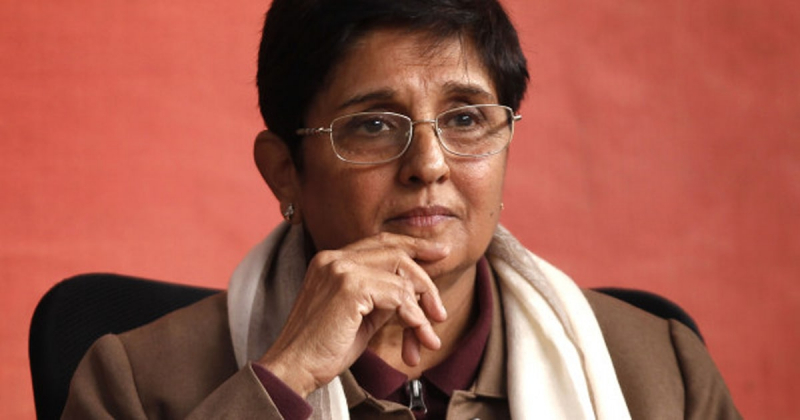
Photo: https://o.aolcdn.com/ -
By 2010, the Indian public was enraged following the exposure of many multibillion-dollar scams, the most notable of which were the 2G spectrum fraud (1.76 lakh crore in 2008), the Satyam Scam (14,000 crores in 2009), and the Commonwealth Games Scam (70,000 crores, 2010). This obvious embezzlement of public funds prompted Shri Anna Hazare to spearhead an Anti-Corruption Movement in 2011. Kiran Bedi formed India Against Corruption (IAC) Group with other activists, including Arvind Kejriwal (former bureaucrat and current Delhi's 7th Chief Minister). The Jan Lokpal Bill, which would create an independent authority to examine corruption charges, was one of the demands made by the organization. The movement eventually expanded into the notable 2011 Indian Anti-Corruption Movement, which comprised a series of demonstrations and protests across India aimed at enacting strong legislation and enforcement against what was seen to be widespread political corruption. The movement drew worldwide notice and was named one of Time Magazine's "Top 10 News Stories of 2011."
Bedi and other important members of IAC were held by the authorities on August 16, 2011, only to be released later that day. The movement resulted in a round of talks between the government and activists, and the Parliament passed a resolution to consider three points in the drafting of the Lokpal Bill: a citizen charter, the subordination of lower bureaucracies to Lokpal through appropriate mechanisms, and the establishment of Lok Ayuktas in states. Despite being a significant figure in the movement, Kiran Bedi withdrew from India Against Corruption (IAC) Group in 2012, when a faction led by Arvind Kejriwal created the Aam Aadmi Party (AAP). This is also considered one of the major achievements of Kiran Bedi.
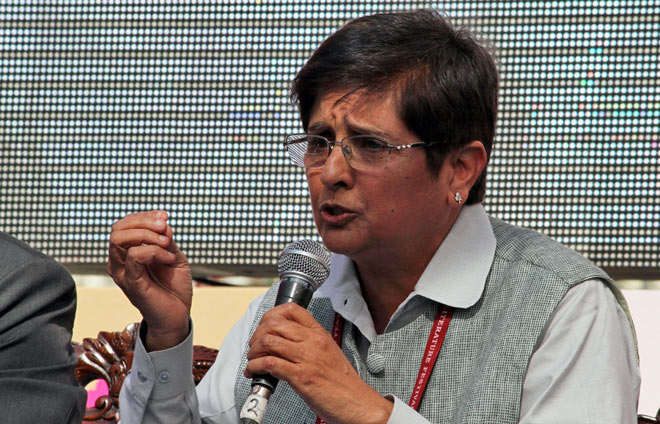
Photo: https://akm-img-a-in.tosshub.com/ 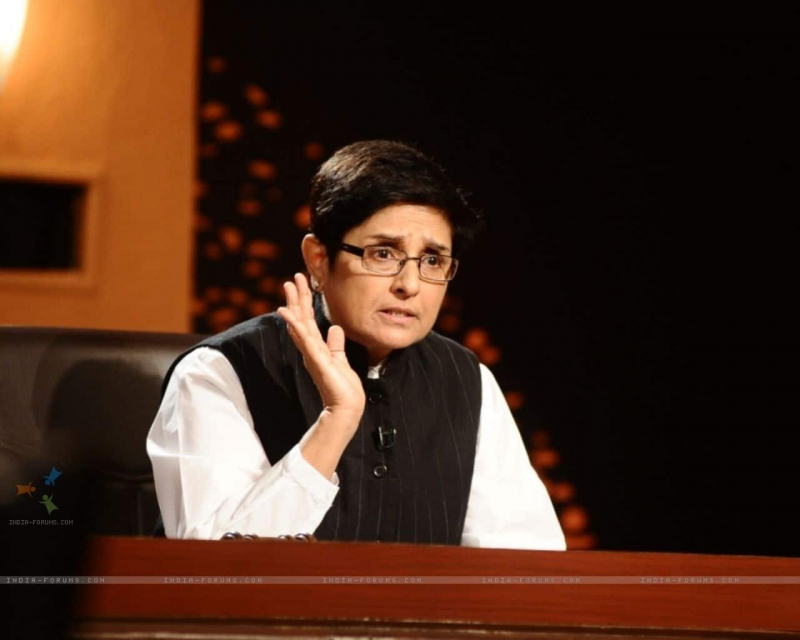
Photo:https://www.womenexclusive.in/ -
After the Bhartiya Janta Party (BJP) won a landslide victory in the 2014 Lok Sabha (central) elections, Dr. Kiran Bedi joined the party in 2015. She ran as the party's Chief Ministerial candidate in the 2015 Delhi Assembly Election but lost. President of India Pranab Mukherjee appointed her the 24th Lieutenant Governor of the union territory of Puducherry on May 22, 2016. Kiran Bedi took the initiative in her new position to open the gates of Raj Nivas (the Governor's home) to the public, transforming it into the "People's Nivas." She began an 'Open House' approach in which members of the public could come to Raj Nivas from Monday through Wednesday at 5 p.m. to meet the Lieutenant Governor and have their concerns addressed.
Dr. Kiran Bedi's project "Mission Water Rich Puducherry" is one of her most notable accomplishments as Lieutenant Governor of Puducherry. When she learned that the Public Works Department (PWD) lacked the finances to de-silt water canals and drains, she enlisted the help of the community through CSR and connected contributors with JCB machine contractors. She then de-silted the channels on short notice. She has also implemented various best practices relating to Management Lessons in Puducherry as the Lieutenant Governor, which she recently detailed at the 50th Governors Conference in Delhi. Each of these methods, from financial prudence to enlisting community support and holding an open house, has aided in the huge development of Puducherry.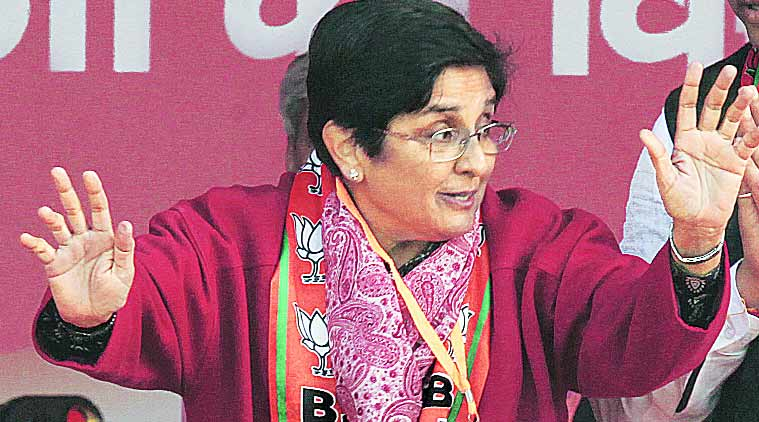
Photo: https://images.indianexpress.com/ 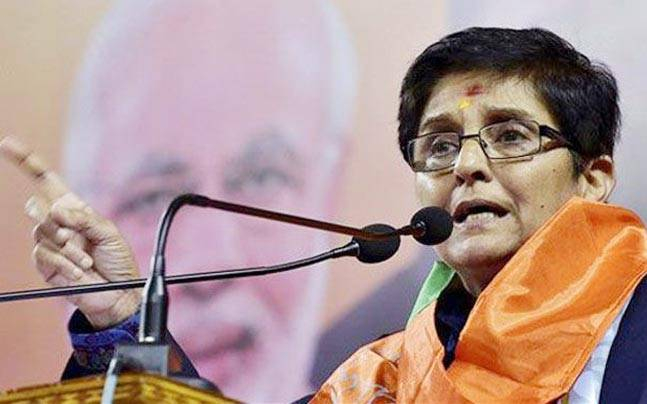
Photo: http://media2.intoday.in/ -
Shrimati (Mrs) Kiran Bedi has long been a symbol and source of inspiration for Indians. She has been named India's most admired woman (THE WEEK 2002), India's most trusted woman (Readers Digest, March 2010, Navbharat Times 2012); MSN Most Admired Indian Female Icon 2011; and The Economic Times' top 10 women icons of 2013. In 2018, she was included in Mega Icons, a National Geographic-created multi-part series.
The show is centered on inspirational personalities' success stories. She has received numerous prestigious awards, including the International Woman Award in 1992, the United Nations Medal for outstanding service (2004), the June Morrison-Tom Gitchoff award for significant improvement of the quality of justice (2001), and the Asia Region Award for drug prevention and control (1991). Kiran Bedi has written a number of books, including It's Always Possible: One Woman's Transformation of Tihar Prison; Empowering Women... As I See; Be the Change: Fighting Corruption; Yeh Sambhav Hai (in Hindi); and Dr. Kiran Bedi: Creating Leadership.
With her achievements and efforts while working, it is of course not surprising that she is considered the most admired person in India. Not only that, this is probably the reason why she has been trusted by the people of India and is also considered one of the major achievements of Kiran Bedi.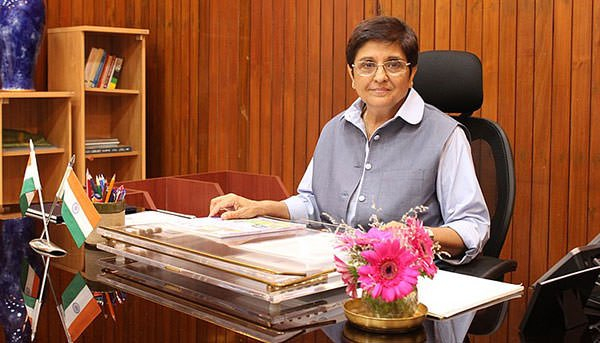
Photo: https://learnodo-newtonic.com/ 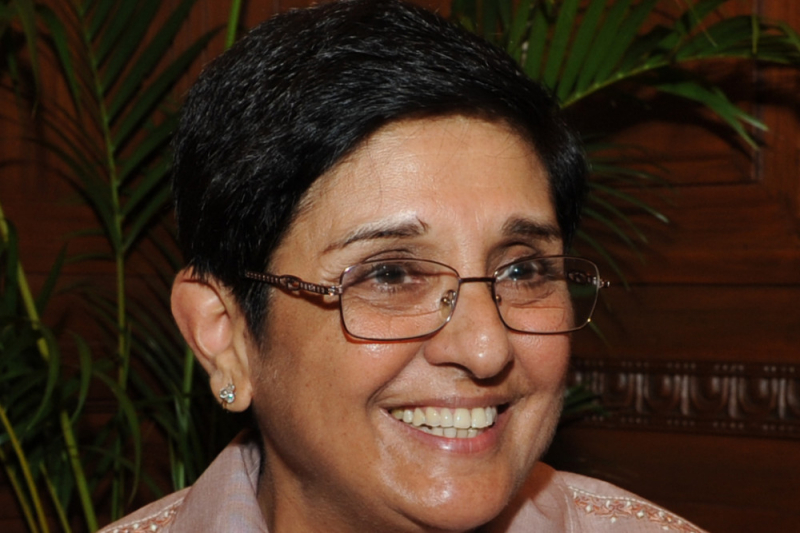
Photo: http://workingwomanreport.com/


















